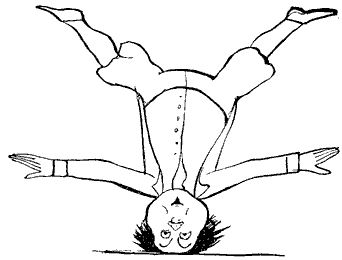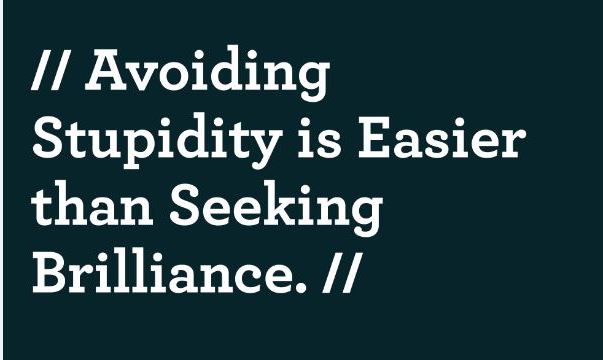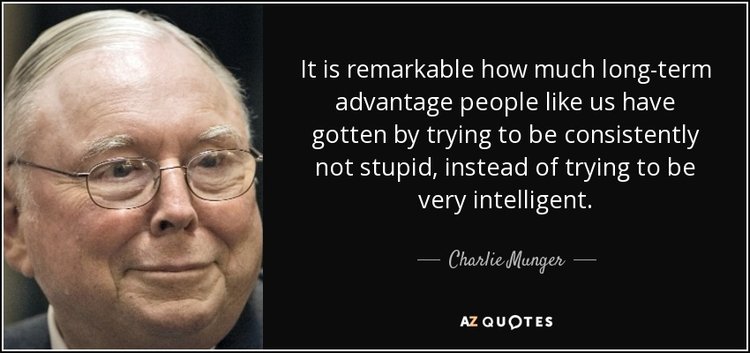Inversion
Avoiding Stupidity Is Easier Than Seeking Brilliance
Think about what you want to avoid, or the opposite of what you want to achieve, then plan effectively to prevent failure.

Inversion - An Overview
Inversion is thinking about your objective in reverse.
Instead of thinking forward about what you need to do to get what you want, you spin it round and in reverse, away from your objective, about what you don’t want to happen.
So for example, in thinking about what I was going to write in this article I thought about writing a lot of waffle, with long words and a lack of clarity, and with no clear take-away points.
A real-life current and personal example of inversion
Another real-life example: at time of writing in late March 2021 most of the world is still suffering the effects of extended lock-downs.
My current primary business is, or now was, the fuel trade. My role was in bringing together buyers and sellers of crude oils and also refinery produced refined fuel products, and a major part of this was in conducting the necessary due diligence to weed out the spurious, the time-wasters and the fraudulent.
Given that much of the world's oil is pumped and refined in some of the poorest and most badly run countries in the world and thus least equipped to deal with the effects of the pandemic, and given the inevitable slump in global fuel demand, my business is currently dead.
I have been giving much thought about how I can refocus the skills that I have developed in the fuel market into other business sectors.
If I apply inversion to this challenge, I will do the following:
- I will not accept the present realities
- I will refuse to move out of the fuel business
- I will say "No" to everything
- I will maintain a negative attitude and expect nothing good to happen
- I will not take care of my energy state and will wallow in despair and self-pity
- I will immerse myself in constant, frenzied activity to delude myself into thinking that somehow I can just make it happen
- I will not follow up on any intuitive ideas or hunches I may have
- I will not take steps to ensure that I remain mentally sharp and alert and I will exist in a state of unfocused unpreparedness so that I will not recognise my next opportunity when it comes
- I will not consider alternative scenarios in which I can apply my skills
- I will give up
As you can see, all of these inversions are really about my "inner game".
Through this inversion exercise, what becomes clear to me is that whilst most of the external aspects of this situation are out of my control, what I CAN do is manage my inner state and my response to these events and I do have have a very large degree of control over that.

German mathematician, Carl Jacobi, developed the inversion technique and he was well-known for solving difficult problems by using the simple strategy of ‘man muss immer umkehren,’ which means ‘Invert, always invert.’
He proposed that hard problems could be solved more easily and more quickly through inversion.
Success Equals Good Decisions Minus Bad Decisions.
The most powerful benefit of using the inversion technique is that it will help you to avoid the bad decisions preventing you from achieving your goals.
Charlie Munger highlights this point:
“Invert, always invert: Turn a situation or problem upside down. Look at it backward. What happens if all our plans go wrong?
Where don’t we want to go, and how do you get there? Instead of looking for success, make a list of how to fail instead–through sloth, envy, resentment, self-pity, entitlement, all the mental habits of self-defeat.
Avoid these qualities and you will
succeed."

Further Reading: Avoiding Bad Decisions
Return from "Inversion" to: The Power Of Opposite Thinking
Or to: Mental Models
LATEST ARTICLES
Master The Season You Are In - The Key to Fulfilling Your Purpose
 To fulfil your purpose, you must first master the season you are in. One of the biggest mistakes you can make in life is focusing all your energy on the next season instead of learning to master the s…
To fulfil your purpose, you must first master the season you are in. One of the biggest mistakes you can make in life is focusing all your energy on the next season instead of learning to master the s…The Inner Weight of Shame - Sustained By Attentional Fixation
 A Mind That Is Continuously Engaged In Self-Surveillance. Shame is one of the heaviest inner burdens a human being can carry. It does not announce itself loudly or demand attention through drama. Inst…
A Mind That Is Continuously Engaged In Self-Surveillance. Shame is one of the heaviest inner burdens a human being can carry. It does not announce itself loudly or demand attention through drama. Inst…Does Prayer Work? The Psychology of Prayer, Meditation and Outcomes
 Reality Is A Complex System Of Countless Interactions - Including Yours. So does prayer work? The problem is that the question itself is usually framed in a way that guarantees confusion. We tend to a…
Reality Is A Complex System Of Countless Interactions - Including Yours. So does prayer work? The problem is that the question itself is usually framed in a way that guarantees confusion. We tend to a…Living in Survival Mode Without Surrendering Mental Authority
Living in Survival Mode Without Surrendering Mental Authority
 Clear Thinking When You’re Just Trying to Stay Afloat. Many people today are overwhelmed because they are living in survival mode - not temporarily, but as a persistent condition of life. For many, th…
Clear Thinking When You’re Just Trying to Stay Afloat. Many people today are overwhelmed because they are living in survival mode - not temporarily, but as a persistent condition of life. For many, th…Manifestation Without Magic: A Practical Model
 Manifestation without magic is not a softer or more intellectual version of popular manifestation culture. It is a different model altogether. Popular manifestation teachings tend to frame reality as…
Manifestation without magic is not a softer or more intellectual version of popular manifestation culture. It is a different model altogether. Popular manifestation teachings tend to frame reality as…Staying Committed When You Can't See Progress - The Psychology of Grit
 Uncertainty Is Not The Absence Of Progress, Only The Absence Of Reassurance. One of the most destabilising experiences in modern life is not failure, but uncertainty and staying committed when you can…
Uncertainty Is Not The Absence Of Progress, Only The Absence Of Reassurance. One of the most destabilising experiences in modern life is not failure, but uncertainty and staying committed when you can…The Battle For Your Mind - How To Win Inner Freedom In A Digital Age Of Distraction
 From External Events to Inner Events. We often think of “events” as things that happen out there: the traffic jam, the rude comment, the delayed email reply. But what truly shapes our experience is wh…
From External Events to Inner Events. We often think of “events” as things that happen out there: the traffic jam, the rude comment, the delayed email reply. But what truly shapes our experience is wh…How to See Your Thoughts Without Becoming the Story
 A Practical Guide to Thought-Awareness. You can spend your life inside the stories of your mind without ever learning how to see your thoughts clearly and objectively. Most of the stuff we tell oursel…
A Practical Guide to Thought-Awareness. You can spend your life inside the stories of your mind without ever learning how to see your thoughts clearly and objectively. Most of the stuff we tell oursel…The Collison Decision Matrix - A Simple Framework for Better Choices
 The Collison Decision Matrix Is A Practical Everyday Thinking Tool. Most of us spend a surprising amount of time worrying about decisions. From small ones such as what to wear, what to eat, what to te…
The Collison Decision Matrix Is A Practical Everyday Thinking Tool. Most of us spend a surprising amount of time worrying about decisions. From small ones such as what to wear, what to eat, what to te…The Power Of Asking The Right Question
 The Power Of Asking The Right Question Lies In The Quest For Insight. To experience the power of asking the right question you must develop the practice of asking questions. The best way to improve th…
The Power Of Asking The Right Question Lies In The Quest For Insight. To experience the power of asking the right question you must develop the practice of asking questions. The best way to improve th…Site Pathways
 Here is a site pathway to help new readers of Zen-Tools navigate the material on this site. Each pathway is based around one of the many key themes covered on this site and contain a 150 word introduc…
Here is a site pathway to help new readers of Zen-Tools navigate the material on this site. Each pathway is based around one of the many key themes covered on this site and contain a 150 word introduc…